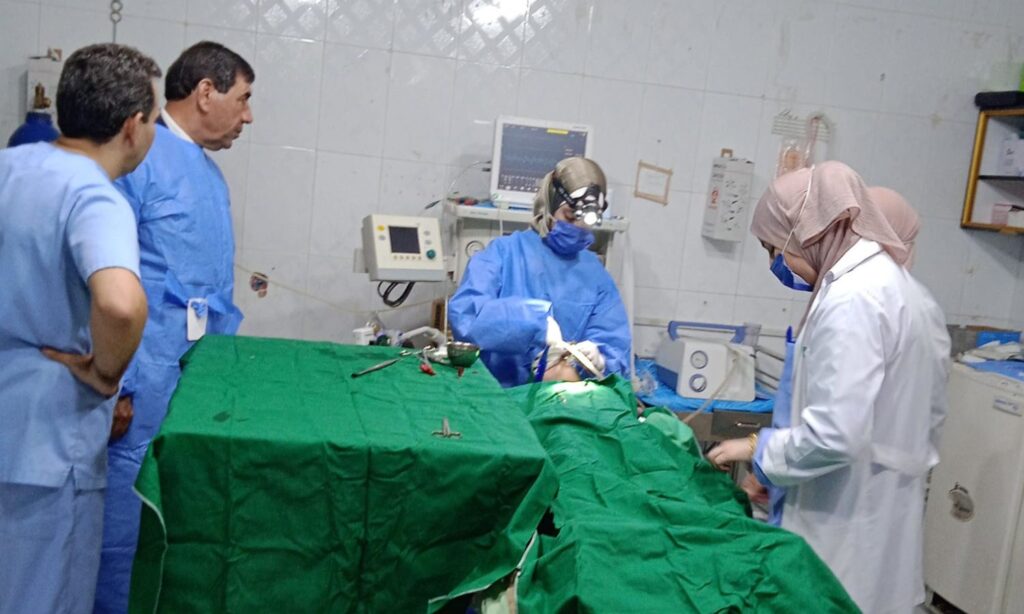Daraa – Halim Muhammad
Abdul Rahman (55 years old), living in the city of Jassem in northern Daraa, is waiting for the kidney dialysis machines in Jassem National Hospital to operate and to eliminate the cost of transferring him to the hospital in Nawa, where he has been undergoing dialysis for his kidneys for two years
Twice a week, Abdul Rahman undergoes dialysis, paying 200,000 Syrian pounds (13 US dollars) for private vehicle fees to the city of Nawa, not to mention the waiting difficulties and the irregular operation of machines at Nawa National Hospital due to the lack of diesel.
He sometimes has to go to the hospital three times, which increases his costs, in addition to the fatigue and physical exhaustion.
In a conversation with Enab Baladi, Abdul Rahman expressed hope for the operation of the kidney department in Jassem Hospital, which would alleviate his financial and physical burdens, especially as there has been a recent campaign by local leaders to resume operation of the departments there.
“Kun Balsaman” campaign
At the beginning of October, local leaders in the city of Jassem launched a fundraising campaign called “Kun Balsaman” (Be a Balm) to buy equipment for Jassem National Hospital and renovate several of its sections, with participation from most towns in the al-Jidour area of northern Daraa.
Qasem al-Shahadat, a member of the local committee (a joint committee between the local community and hospital staff), told Enab Baladi that the committee had raised nearly 2.9 billion Syrian pounds (195,000 US dollars) since the launch of the campaign, which is still ongoing.
He added that the local committee succeeded in purchasing three dialysis machines and a surgical endoscope and they are awaiting their shipment to the hospital in the coming days.
In 2023, a resident of Jassem donated the price of a dialysis machine, but the hospital management refused to operate it for technical reasons, as a backup machine is required to complete the dialysis process.
He stated that the campaign successfully renovated four operating rooms, a section for women’s diseases, purchased a surgical endoscope, and activated 35 clinics in the hospital.
Al-Shahadat mentioned that the committee is soliciting bids to purchase a CT scan machine, and the renovation work done by the community efforts included the rehabilitation of four operating rooms and the renovation of the emergency, imaging, and women’s sections.
Previously, the committee undertook the task of laying a permanent electricity line for drinking water pumping stations, the hospital, and government departments, which was part of a previous campaign in the city of Jassem called the “Water Supply” campaign. This electrical line has contributed to saving diesel costs, as it provides continuous electricity to the hospital around the clock.
One hospital in the region
Jassem government hospital is the only hospital in the al-Jidour area, serving the cities of Jassem, Inkhel, Nawa, and al-Hara, as well as the villages of Zamrin, Samlin, al-Mal, al-Taiha, Jadiah, and al-Dali, catering to more than 300,000 residents, according to activists in the area.
Al-Shahadat noted that a robbery incident in which a patient was killed while returning from a dialysis session along the road connecting Nawa and Jassem prompted the community to launch the fundraising campaign, quickly gaining support from neighboring villages that also benefit from the operation of the hospital.
The hospital provides its services to patients at symbolic fees, which are collected in the hospital’s fund to support the renovation operations, charging patients a third of the total surgical costs, such as collecting 5,000 Syrian pounds for radiological imaging fees.
Government negligence
Despite being a government hospital under the Daraa Health Directorate, the directorate has only provided some medical supplies for operations and a few medications.
A source in the local committee stated that the hospital has an ambulance that remains with the health directorate, which has yet to be sent to the hospital’s administration, and that the hospital also has a staff dormitory bus that the directorate is still withholding despite previous requests for it.
Officials of the Syrian regime government did not deny the local community’s role in rehabilitating Jassem National Hospital. Bassam al-Suwaidan, Director of Health in Daraa, stated to the government al-Thawra newspaper that the local community has contributed to rehabilitating Jassem National Hospital by purchasing dialysis machines, renovating sections, maintaining the CT scan machine, preparing operating rooms, and renovating the radiology and emergency sections.
Last August, the local community completed renovations to al-Hirak government hospital, having previously completed renovations to Busra al-Sham National Hospital in April.
There are seven public hospitals in Daraa province and thirteen private hospitals, but government hospitals suffer from a lack of support and face shortages in medical staff, especially after most doctors migrated, causing some to contract with private hospitals, pushing some residents to go directly to private hospitals for better equipment and staff availability.

